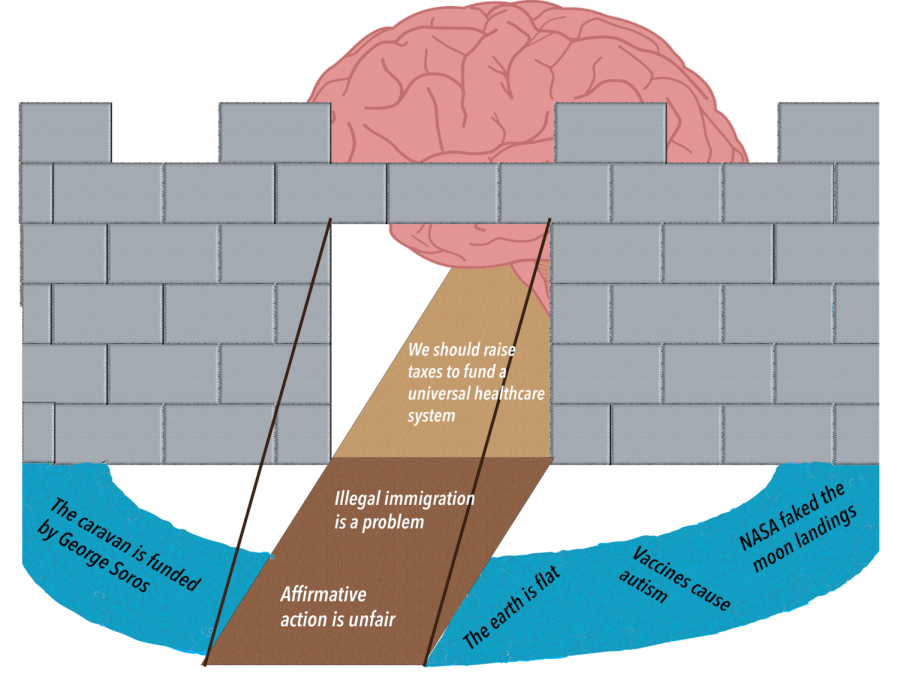A condemnation of conspiracies
December 2, 2018
To raise anti-immigration sentiment as the midterms came up, a conspiracy theory gained popularity on social media that posited billionaire George Soros is surreptitiously funding the caravan of central American asylum-seeking immigrants. President Trump, espousing another theory, claims that there are Middle Easterners on this caravan — which, again, originated in Honduras.
A conspiracy theory is, according to Merriam-Webster, “a theory that explains an event or set of circumstances as the result of a secret plot by usually powerful conspirators”. When conspiracy theories are believed so widely, it is easy to be drawn in and give credence to many of them.
According to TIME, about 10 percent of Americans in 2015 believed that vaccines are unsafe and cause autism, despite numerous scientific studies that prove otherwise. This surge in lack of vaccination has had real-world consequences; for example, a measles outbreak in Minnesota in 2017 was largely triggered by a low vaccination rate within the Somali-American community, according to the CDC.
According to a 2015 Washington Post article, about 25 percent of Americans, including now-President Trump, endorsed the “birther” conspiracy, claiming that then-President Obama is not an American citizen, and 19 percent were 9/11 “truthers,” believing that the tragedy that occurred on Sept. 11, 2001, was an elaborate hoax. The annual Flat Earth International Conference, to be held next week in Denver, will feature 26 speakers, and Infowars host Alex Jones believes that the Pentagon is releasing chemicals into the water that are turning “the friggin’ frogs gay.”
With these relatively widespread beliefs, it’s easy to forget that these viewpoints have no rationale behind them. In a time where facts and opinions are often conflated, it is important to remember that some measure of objective reality does continue to exist.
However, we tend to overestimate our knowledge of the world and thus fail to consider that we could be wrong. Galileo in his time was regarded as a heretic; now, he is known as the father of modern science.
One of the premier examples of this is the Mueller investigation, which essentially posits an international conspiracy at the highest levels of government to elect Donald Trump in the 2016 presidential election. Nothing has been proven yet, but the investigation has uncovered key evidence that has led to a number of White House staff resigning, suggesting some parts of it may be true. Mueller’s investigation is a true conspiracy by its very definition, and clearly, it cannot be ignored.
This is also true on a smaller scale, as people on both sides of the aisle dismiss viewpoints that are simply antithetical to their own. Calling a conservative speaker to speak at a liberal university shouldn’t cause protests; instead, it should be an opportunity for everyone to listen, have an intellectual debate, and perhaps even gain new perspectives.
Thus, it is imperative to dismiss the conspiracy theories that come without a shred of evidence and could cause real-world consequences, no matter how many people believe them. At the same time, blindly doubling down on beliefs is dangerous, and causes divides between people that could simply be solved through peaceful debate.


















![“[Building nerf blasters] became this outlet of creativity for me that hasn't been matched by anything else. The process [of] making a build complete to your desire is such a painstakingly difficult process, but I've had to learn from [the skills needed from] soldering to proper painting. There's so many different options for everything, if you think about it, it exists. The best part is [that] if it doesn't exist, you can build it yourself," Ishaan Parate said.](https://harkeraquila.com/wp-content/uploads/2022/08/DSC_8149-900x604.jpg)




![“When I came into high school, I was ready to be a follower. But DECA was a game changer for me. It helped me overcome my fear of public speaking, and it's played such a major role in who I've become today. To be able to successfully lead a chapter of 150 students, an officer team and be one of the upperclassmen I once really admired is something I'm [really] proud of,” Anvitha Tummala ('21) said.](https://harkeraquila.com/wp-content/uploads/2021/07/Screen-Shot-2021-07-25-at-9.50.05-AM-900x594.png)







![“I think getting up in the morning and having a sense of purpose [is exciting]. I think without a certain amount of drive, life is kind of obsolete and mundane, and I think having that every single day is what makes each day unique and kind of makes life exciting,” Neymika Jain (12) said.](https://harkeraquila.com/wp-content/uploads/2017/06/Screen-Shot-2017-06-03-at-4.54.16-PM.png)








![“My slogan is ‘slow feet, don’t eat, and I’m hungry.’ You need to run fast to get where you are–you aren't going to get those championships if you aren't fast,” Angel Cervantes (12) said. “I want to do well in school on my tests and in track and win championships for my team. I live by that, [and] I can do that anywhere: in the classroom or on the field.”](https://harkeraquila.com/wp-content/uploads/2018/06/DSC5146-900x601.jpg)
![“[Volleyball has] taught me how to fall correctly, and another thing it taught is that you don’t have to be the best at something to be good at it. If you just hit the ball in a smart way, then it still scores points and you’re good at it. You could be a background player and still make a much bigger impact on the team than you would think,” Anya Gert (’20) said.](https://harkeraquila.com/wp-content/uploads/2020/06/AnnaGert_JinTuan_HoHPhotoEdited-600x900.jpeg)

![“I'm not nearly there yet, but [my confidence has] definitely been getting better since I was pretty shy and timid coming into Harker my freshman year. I know that there's a lot of people that are really confident in what they do, and I really admire them. Everyone's so driven and that has really pushed me to kind of try to find my own place in high school and be more confident,” Alyssa Huang (’20) said.](https://harkeraquila.com/wp-content/uploads/2020/06/AlyssaHuang_EmilyChen_HoHPhoto-900x749.jpeg)










